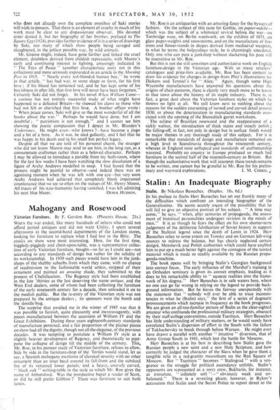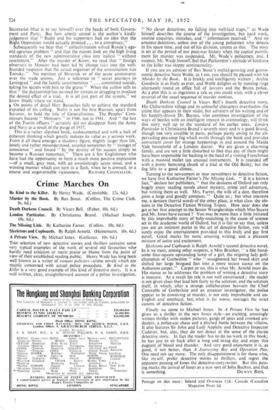Stalin : An Inadequate Biography
Stalin. By Nikolaus Basseches. (Staples. 18s. 6d.)
IN his preface to Stalin Herr Basseches has set out frankly many of the difficulties which confront an intending biographer of the Generalissimo. He seems acutely aware of the possibility that he will fail to give an objective portrait of his subject. " A time may come," he says, " when, after centuries of propaganda, the assess- ment of historical personalities undergoes revision in the minds of men." It is as though he fears the effect on his own shorter-term judgement of the deliberate falsification of Soviet history in support of the Stalinist legend since the death of Lenin in 1924. Herr Basseches relies to some extent on Trotsky and- on German left-wing sources to redress the balance, but hqs clearly neglected certain emigre, Menshevik and Polish authorities which could have enabled him to put up a much better fight against the contagion of the tainted material which is made so readily available by the Russian propa- ganda-machine.
The book opens well by bringing Stalin's Georgian background into correct focus. The early influence of the Marshal's training in an Orthodox seminary is given its correct emphasis, leading as it does to his remarkable ability to " squeeze realities into the frame- work of his dogma." Herr Basseches is in safe waters here, where no one can go far wrong in relying on the legend to provide back- ground information. But he leaves the fairway unexpectedly with the statement that " nobody will ever be able to trace inconsis- tencies in what he (Stalin) says," the first of a series of dogmatic pronouncements which increase in frequency as the book progresses. We are given an all-too-familiar picture of Stalin as the clear-sighted amateur who confounds the professional military strategists, obsessed by their staff-college conventions, outside Tsaritsyn. Herr Basseches has little understanding of military matters,' or he would surely have correlated Stalin's dispersion of effort in the South with the failure of Tukhachevsky to break through before Warsaw. He might even have drawn a parallel with another " intuitive " diversion, that of Army Group South in 1941, which lost the battle for Moscow. Herr Basseches is at his best in describing how Stalin gave the Russian people a new saint and a new Holy Scripture, and how correctly he judged the character of the Slays when he gave them a tangible relic in a red-granite mausoleum on the Red Square of Moscow. But " Tsaritsyn " becomes " Stalingrad " with a ven- geance as the struggle for political ascendancy unfolds. Stalin's opponents are represented as a sorry crew, Bukharin, for instance, as irresolute, " infinitely soft "," obviously weak and un- balanced." There is a revealing gleam, however, in Rykov's accusation that Stalin used the Secret Police to report direct to the Secretariat (that is to say himself) over the heads of both Govern- ment and Party. But how utterly unreal is the author's kindly judgement that " Stalin and his supporters had no idea that the Right Opposition would actually proceed ... to a conspiracy."
Subsequently we hear that " collectivisation solved Russia's age- Old agrarian problem " and that the masses look on the high living standards of the new administrative class (my italics) " without resentment." After the murder of Kirov, we read that " foreign Observers in Moscow had been led by chance (sic) into the well- founded suspicion that the actual organiser of the assassination was Iomsky." No mention of Shvernik or of the acute controversy over the trade unions. Just a reference to " secret journeys to Leningrad " and the faintly sanctimonious " . committed suicide, taking his secrets with him to the grave." When the author tells us that " the dictatorship has no need for torture or drugging to produce the desired effect of a trial. It is all just part of the system," we know finally where we stand.
On points of detail Herr Basseches fails to achieve the standard expected of his calling. Stalin is not the first Russian, apart from Suvorov, to hold the title of Generalissimo. The Peoples' Com- missars became " Ministers " in 1946, not in 1941. And " the last of the Tsarist officers " certainly did not disappear from the Army and Navy as a result of the purge of 1937.
This is a rather slipshod book, undocumented and with a lack of coherent thinking which greatly reduces its value as a serious work. From it all there emerges a shadowy figure, slightly larger than life, lonely and rather misunderstood, assailed sometimes by " twinges of conscience " and forced " by the destiny of his success simply to become a Russian statesman." There are a few Englishmen who have had the opportunity to form a much more positive impression —of a small, grey man, with an astonishingly acute mind, and a winning manner which can turn in a flash, when he is crossed, to a
coarse and ungovernable viciousness. RICHARD CHANCELLOR.











































 Previous page
Previous page